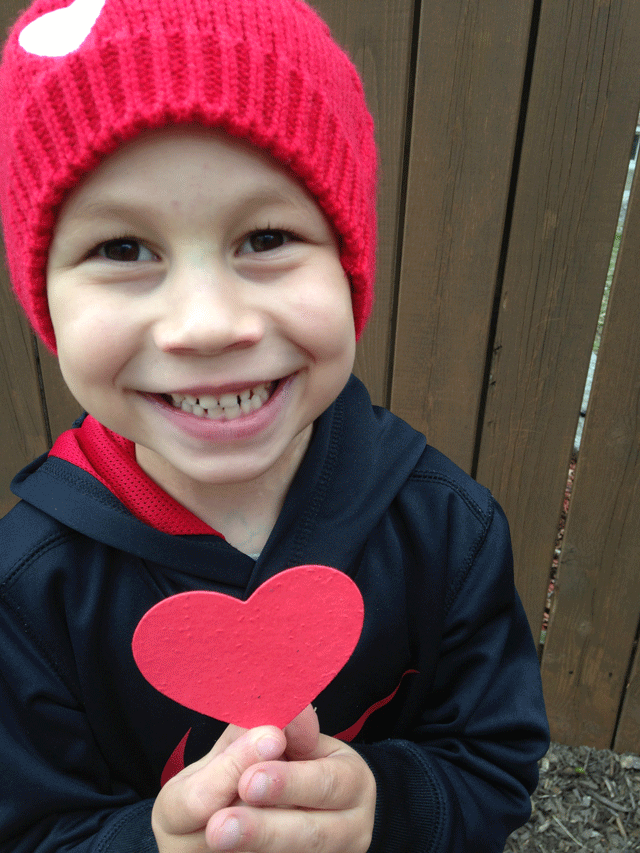He’s only six years old, but Owen Veloso has five heart surgeries under his belt.

After completing the final stages of his heart reconstruction surgery, Veloso played in the snow for the first time this winter. He was skeptical – after years of spending recess indoors and avoiding extreme weather, he wasn’t sure his repaired heart could handle the cold.
“Then he was outside playing in the snow everyday. He jumps and takes a faceplant in the snow because it felt so good. This might not be huge, but for us it’s like his entire life has changed,” she said.
READ MORE: How heart disease has changed over the past 60 years
The little boy was born with hypoplastic left heart syndrome, a left side of the heart that’s so underdeveloped that people with the condition are often told they’re born with half of a heart.
Those born with HLHS in past decades wouldn’t have survived, but now patients are thriving, living well into their 30s and potentially longer.
His family says Veloso is alive today thanks to advances in cardiovascular research.
On Thursday, the Heart and Stroke Foundation launched a partnership with Canadian Pacific, which poured $3 million of funding into cardiac research. The foundation says the collaboration, which will span three years, is the largest in the organization’s history.
The money is going a long way, too: it’ll go towards cardiac research grants at hospitals, universities and research centres across Canada. CP, with its community investment program, is hoping its funding will zero in on families, genetics, and helping those who are young and old and dealing with heart disease.
READ MORE: Pay attention to stroke warning signs, Heart and Stroke Foundation says
- Naloxone-resistant street drug linked to 9 deaths in Eastern Canada seized in Alberta
- ‘She gets to be 10’: Ontario child’s heart donated to girl the same age
- Buzz kill? Gen Z less interested in coffee than older Canadians, survey shows
- Bird flu risk to humans an ‘enormous concern,’ WHO says. Here’s what to know
“Research is what informs everything we do at the Heart and Stroke Foundation,” the organization’s national CEO, David Sculthorpe, told Global News.
Right now, it invests about $30 million annually into research. Scientists, doctors and academics file proposals — upwards of 400 — that go through a peer review process so they’re ranked by experts and everyday Canadians. Around 50 to 100 Canadian-led teams receive grants annually.
Their findings help in shaping policy, such as determining guidelines on sugar or salt intake, to shedding light on new discoveries that save lives, such as the sophisticated surgeries in Veloso’s path to survival.
Research has paved the way for improving interventions, making imaging equipment and tools more precise, and advancing doctors’ understanding of heart disease, Sculthorpe said.
“Research knows no boundaries…everything we advocate for comes from discovery and science,” he said.
He said both organizations were fostering their relationship for the past year. By October, the first batch of grants will be awarded to researchers.
READ MORE: Some Canadians misunderstanding stroke recovery process, report says
The foundation is only 60 years old but in its six decades of existence, the death rate from heart disease and stroke has decreased by 75 per cent. It’s pointing to advances in research and medicine as the reason why.
Still, scientists need to push forward, the organization says. Canada has an aging population, along with rising rates of obesity and diabetes. Heart disease accounts for 27 per cent of all deaths each year in the country.
But Sculthorpe points to Veloso as an example of “living proof” that the funding is worth it.
“It’s clear that if this boy had been born a decade or two earlier, he wouldn’t have survived. Because of these medical advances, he’ll in all likelihood have a very good life ahead…this is about saving lives and then it’s promoting a healthier life moving on,” he said.
READ MORE: 5 lifestyle changes to improve your heart’s health
Veloso completed the last of three stages of heart reconstruction surgery in January. While he grew up idolizing his big brother who is an athlete, he’s also signed up for the softball team this summer.
“Before, his body wasn’t able to handle what his brain wanted to do. He’s amazed at how much he can do now and he’s so excited,” Veloso’s mother said.
Watch Owen’s story here.
carmen.chai@globalnews.ca
Follow @Carmen_Chai





Comments